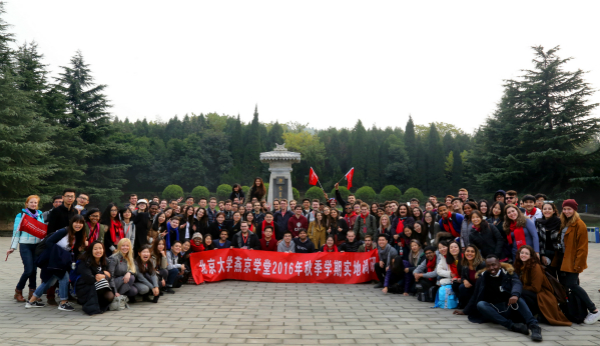On November 16th, the Yenching Academy of Peking University struck out on its very own Journey to the West, conducting a week-long field study and cultural exploration in Xi’an, Shaanxi Province. Designed to add a degree of depth and breadth to students’ understanding of Chinese history and society, the Xi’an trip allowed scholars to break out of the “Beijing Bubble” and experience China’s rich diversity firsthand. Students departed Beijing aboard a high-speed train, arriving five hours later in one of China’s most historic and culturally vibrant cities.

The first part of the trip was primarily devoted to exploring Xi’an’s rich history. Beginning with a visit to the famed Terracotta Warriors and Qin Shi Huang’s mausoleum, scholars reflected upon the achievements (and megalomania) of China’s first emperor. Over the course of the week, students toured various historically significant sites from different periods of Xi’an’s long and illustrious past. These included the Forest of Stone Steles, the Tomb of Princess Yong Tai, and the Qian Mausoleum outside the city which was built in the 7thcentury as a final resting place for Tang dynasty royals such as the Emperor Gaozong and his wife, the Empress Wu Zetian.



The trip also featured a strong cultural component designed to give scholars a sense of China’s various artistic and aesthetic traditions, particularly those native to Shaanxi. The Yenching Academy was introduced to the ancient and increasingly uncommon art of shadow puppetry and enjoyed a performance put on by local practitioners. This was followed by a visit to the Guanzhong Folk Art Museum which showcased traditional Chinese architecture as well as live folk music. Some scholars even had the unique opportunity to try their hand at playing traditional instruments under the instruction of the masters. Finally, the cohort attended a performance of local Qinqiang opera, an art form that claims continuity with musical styles stretching back to the Qin dynasty. After a detailed introduction covering the history and present status of Qinqiang, scholars were treated to a series of vignettes designed to give a sense of the different roles and styles that comprise the tradition.




Scholars also had the opportunity to learn about Xi’an as a living, modern city. Students Guo Yongpei, Kristen Kelly, and Rosie Levine gave presentations on features of Chinese urban planning and about the implications of the development and preservation of historic cities. This was followed by a trip to the Xi’an Urban Planning Museum where scholars were introduced to the historical evolution of Xi’an as city and possible visions for future development. “Attending the student presentations was a personal highlight,” remarked Hannah Feldshuh. “Discussing contemporary issues in historic preservation as informed by my classmates’ research reinforced the diversity of academic expertise within the YCA community. From the history of linongs in Shanghai to the evolution of hutongs in Beijing, my classmates helped connect themes in our broader curriculum with our experience in Xi’an.”

On the final day of the trip, scholars were given a free day to explore Xi’an independently. The Muslim Quarter of the Old City was an especially popular destination featuring bustling street life, abundant souvenir shopping, and local culinary specialties such asrou jia moandbiang biang mian. Students also made their way to the Great Mosque of Xi’an, with its blend of Muslim and Chinese architectural styles, which stands at the heart of the neighborhood. Others opted to survey the city from the top the Ming dynasty wall which still encircles the center of Xi’an and to ride bikes around its perimeter.

After returning to Beijing, scholars were left to reflect on their shared experiences. “The trip to Xi’an was a wonderful experience that made me think a lot about the scale and influence of Chinese civilization,” said Dongwoo Kim. “The visits to the museums and historical sites and the walks around the city gave me new perspectives of China’s rich history and its diversity that I would not have been able to attain elsewhere.” Other students felt that the excursion had been a valuable bonding experience for the entire cohort of Yenching Scholars. “The field trip to Xi’an was a vibrant mix of history and modernity,” wrote Xu Yang. “Learning with all Yenching Scholars was an impressive way to explore the city…staying together day by day.”